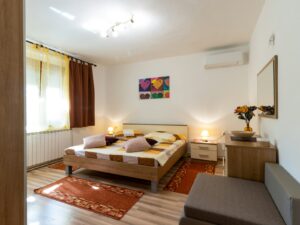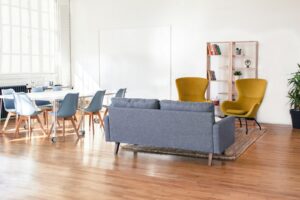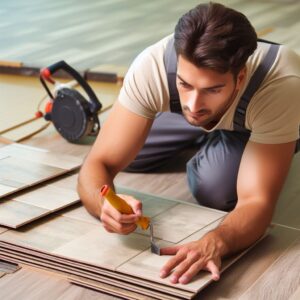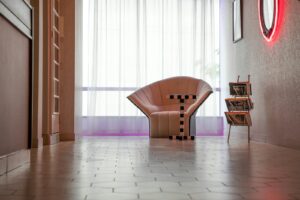The ultraviolet (UV) rays in sunlight can gradually cause vinyl floors to lose their original color and vibrancy. In this blog post, we’ll explore effective ways to prevent fading from sunlight.
To prevent fading from sunlight on vinyl flooring, choose UV-resistant vinyl, install window treatments to block direct sunlight, use area rugs in sun-exposed areas, apply UV-protective window film, schedule regular maintenance, and rotate furniture and decorations to distribute sunlight impact evenly.
Choose UV-Resistant Vinyl Flooring
Opt for vinyl flooring explicitly designed with UV resistance properties. These specially formulated materials provide enhanced protection against the harmful effects of sunlight, making them less susceptible to fading over time.
| Brand/Type | UV Resistance | Wear Layer Thickness | Installation Type | Additional Features |
|---|---|---|---|---|
| ABC Vinyl Planks | High | 20 mil | Click and Lock | Waterproof, Scratch-Resistant |
| XYZ Luxury Tiles | Medium | 12 mil | Glue-Down | Textured Finish, Stain-Resistant |
| UV Shield Collection | Very High | 22 mil | Loose Lay | Anti-Slip, Low VOC |
| Premium Vinyl Elite | High | 18 mil | Floating | Sound Absorption, GreenGuard Gold |
| ProGuard Plus Series | Very High | 25 mil | Glueless | Fade-Resistant, Easy to Clean |
Install Effective Window Treatments
To control the amount of direct sunlight entering your space, consider installing window treatments like blinds, curtains, or UV-blocking window films. These not only serve a functional purpose but also add a decorative touch to your interiors while safeguarding your vinyl floors.
| Treatment Type | UV Blocking | Installation | Additional Features |
|---|---|---|---|
| Blinds | Varies by Material | Mounting Brackets | Adjustable Slats for Light Control |
| Curtains | Varies by Fabric | Rod or Track Installation | Thermal Insulation, Decorative |
| Shades | Varies by Material | Roller or Roman Shades | Various Opacities for Light Control |
| UV-Blocking Window Film | High UV Protection | Adhesive Application | Transparent, Allows Natural Light |
| Plantation Shutters | High UV Protection | Frame Installation | Durable, Adjustable Louvers |
Utilize Area Rugs and Carpets
Place UV-resistant area rugs or carpets strategically in areas exposed to sunlight. These not only enhance the aesthetic appeal of your space but also act as a physical barrier, reducing the impact of sunlight on your vinyl flooring and minimizing the risk of fading.
Apply UV-Protective Window Film
For windows that receive significant sunlight, invest in UV-protective window films. These films effectively block a substantial portion of UV rays while still allowing natural light to illuminate your home, providing an additional layer of defense against fading for both your floors and furnishings.
| Film Brand/Type | UV Protection Level | Installation Type | Transparency | Additional Features |
|---|---|---|---|---|
| SunGuard UV Shield | High | Adhesive Application | Transparent | Reduces Glare, Blocks UV Rays |
| SolarProtect Pro | Very High | Static Cling Application | Nearly Invisible | 99% UV Rejection, Thermal Control |
| UV Blocker Premium | Extreme UV Protection | Adhesive Application | Clear | Blocks UV-A, UV-B, and UV-C Rays |
| ClearView UV Guard | High | Static Cling Application | Crystal Clear | Preserves Natural Light, Scratch-Resistant |
| SunShield Max | Very High | Adhesive Application | Low Reflectivity | Heat Reduction, Fade Protection |
Schedule Regular Maintenance
Establish a routine maintenance schedule to keep your vinyl floors in top condition. Regular sweeping and mopping remove dirt and debris that can act as abrasive agents, potentially accelerating fading. Use a vinyl floor cleaner recommended by the manufacturer to ensure proper care without causing damage.
Rotate Furniture and Decorations
Prevent uneven fading by periodically rearranging furniture and decorations. This practice helps distribute the impact of sunlight more evenly across the entire floor surface, reducing the risk of noticeable fading in specific areas. Consider using furniture pads to further protect your floors from potential scratches.
Control Indoor Humidity Levels
Maintain optimal indoor humidity levels to prevent vinyl flooring from reacting negatively to environmental changes. Excessive moisture or dryness can impact the material and contribute to discoloration. Use a dehumidifier in humid conditions and a humidifier in dry climates to ensure a balanced environment.
| Method | Effectiveness | Implementation | Additional Considerations |
|---|---|---|---|
| Dehumidifiers | High | Stand-alone or Whole-house Systems | Regular Maintenance, Energy Consumption |
| Humidifiers | High | Portable or Whole-house Systems | Regular Cleaning, Monitoring Settings |
| Ventilation Systems | Moderate | Whole-house Systems | Energy-Efficient Models, Air Quality |
| Natural Ventilation | Low to Moderate | Windows, Doors, Vents | Dependent on Outdoor Conditions |
| Air Conditioning | Moderate | Cooling and Dehumidifying | Regular Maintenance, Energy Costs |
Invest in UV-Blocking Window Glass
Consider upgrading to UV-blocking window glass, which naturally reduces the transmission of harmful UV rays into your home. This investment provides long-term benefits by protecting not only your vinyl floors but also other furnishings and artworks from fading.
UV-Blocking Window Glass Options for Homes
| Glass Type | UV Protection Level | Visible Light Transmission | Additional Features |
|---|---|---|---|
| SolarGuard Home | High | 70% | Energy-Efficient, Low Reflectivity |
| Residential UV Shield | Very High | 60% | Blocks UV-A and UV-B Rays |
| ClearView HomeGuard | Extreme UV Protection | 80% | High Clarity, Scratch-Resistant |
| SunShield Max for Homes | Very High | 50% | Reduces Heat, Fade Protection |
| Ultimate UV Block Home Glass | Maximum UV Protection | 45% | Blocks UV-A, UV-B, and UV-C Rays |
Read More
How to Waterproof Vinyl Flooring
LVT vs Standard Vinyl Flooring




